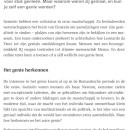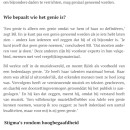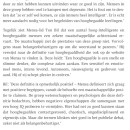Reporters Online about intelligence, stigma and escortservice
On July 31st, Reporters Online published an article on their website about above average intelligence and the genius. Marike, Mensa member and owner of this high class escortservice where interviewed for the article. Reporters Online is a platform where independent journalists can publish their articles. The original article was published in Dutch but below you can find a translation in English.
The genius is dead. Long live the genius!
Leonardo da Vinci, Einstein and Shakespeare are all geniuses. But why were they genius, and can you become a genius yourself? Geniuses have a cult status in our society. For example, scientists studied Einstein's brain to find clues to his genius - slices of his brain can be seen in a museum. A team of researchers tries to find out how Leonardo da Vinci came to his genius discoveries. People with an above-average IQ may join high IQ society Mensa. And through online tests you can test whether you yourself might be a genius.
Recognizing the genius
The interest in the genius already arrived in the Romantic period in the 18th century. Geniuses were people like Isaac Newton, solitary souls with exceptional talents, who used them to make special inventions or deliver other contributions to society. In modern times, where the power of the individual seems almost immeasurably small compared to multinationals and politics, the idea of a genius who can change the world is extra attractive. But how do we recognize true genius?
Extraordinary intelligence is still seen as the main measure of genius. When Lewis Terman, a psychologist at Stanford University in the United States, helped develop the first IQ test in 1916, he believed he could also trace geniuses with this test. In 1920 he started a large-scale, long-term experiment with 1,500 Californian schoolchildren who had an IQ of 140 or higher - according to Terman, the threshold value for genius.
After 35 years, the elect turned out to have not become Nobel Prize winners, Pulitzer winners or Picassos. Others, tested for the research but with 'too low' IQ scores, grew up to renowned scientists, including two Nobel Prize winners.
Combination of talents
Intelligence alone is not enough to identify geniuses - that's what members of Mensa think, 'the high IQ society'. 'To me, a genius is someone who delivers exceptional performances, which we also recognize as such in society,' says Ton Bil, Mensa member since the nineties. 'Intelligence is part of that, but creativity and perseverance are also needed to be able to perform in this way.'
Contemporary scientists are also convinced that a combination of intelligence, creativity and perseverance is necessary to become a genius - with the added possibility to develop all these qualities. Anyone who subsequently uses this to perform special acts may be called genius.
Who decides who is the genius?
'A genius is only a genius because we define him or her like that,' says Bil. And you can only be called a genius if you have shown something - otherwise everyone can say that he or she is special. 'You can not call yourself a genius,' Bil concludes. 'Others have to do that for you.' These others are preferably experts in their field, people with a lot of comparative material.
Bil himself worked in the music world, and he mentions Björk as an example of a contemporary genius. 'She has maximized her talents. Her voice was always exceptional, recognized by other people at a very young age. She has written innovative music and lyrics, showing a perseverance that the audience loves.' And Bil can say that, he thinks, because he understands music. 'Any music lover could call Adele a genius, to which I would say: she indeed has a number of qualities, but for me she is not a genius.'
Stigmas around giftedness
While we adore the genius, the 'average' highly intelligent or gifted person is not looked up to. Monique, who does not want to be mentioned with a surname because of the stigmas attached to giftedness, experiences that herself. 'My son had a hard time at school. In the search for the origin of those problems, we ended up with giftedness, and I also recognized myself in it.'
After an official IQ test she could join Mensa. 'It is nice to occasionally be in company that thinks in the same way as you do. But I hardly ever mention it outside Mensa. People think you are bragging - in the Netherlands you have to act 'normal'. We have to talk about it at school, because the school system is not well-equipped for gifted children.'
Marike van der Velden, Mensa member and owner of escort agency Society Service, is also familiar with stigmatization. 'People who work in my industry are not expected to be of above average intelligence,' she says. As a twenty-year university trainee in Paris, she ended up with Mensa, although she is no longer an active member. 'I have an high class escort in my portfolio who I really believe is a genius, but that does not fit the general image of people working in this industry." Van der Velden also thinks that the image of giftedness and genius is not entirely is correct. 'People confuse intelligence with arrogance and pedantry. Someone who is highly gifted is seen as less socially skilled.'
Social disadvantage
It is precisely this negativity surrounding intelligence that can ensure that potential geniuses never develop. Monique: 'When highly intelligent or highly gifted people doubt themselves and are not heard, they will never develop themselves. There are many people around at Mensa who failed at school or the labor system, and therefore they could not figure out what they are good at. People in this group suffer from depression. It is wrong to think that 'they will get there themselves, after all, they are very intelligent'. Really, more attention is needed for guiding gifted students.'
At the same time, Mensa member Ton Bil sees that a number of highly intelligent and highly gifted people experience a certain social disadvantage. 'Society does not see the achievements of this group. Then advocates are standing up to counter that resistance.' He refers to the definition of giftedness that can also be found on Mensa's website. This reads: 'A gifted person is a fast and smart thinker who can handle complex matters. A sensitive and emotional person, intensely alive. Autonomous, curious and driven by nature. He or she creates pleasure in creating.'
Bil: 'This definition is remarkably positive - Mensa likes to define itself with positive concepts, from the need to claim a social position. The group of scientists and psychologists who came up with this definition have tried to avoid negative traits associated with a high IQ. It could just as well have been that gifted individuals are socially awkward, chaotic, undisciplined and stubborn. But those terms do not sound good in the public debate, certainly not as an advocate.'
Standing out
The contrast with the genius, which society acknowledges as special and positive, could not have been bigger. 'Geniuses are people who clearly stand out from the crowd and are rewarded for it. And, now we come to dangerous territory, if you are a gifted person and feel overlooked. It might be tempting to say: I am a genius. If the outside world says: show something, you can say that you are not well supervised at school, that no one acknowledged how special you were. And that is why you have not yet been able to develop your talents.'
Being a genius is partly natural, partly nurture. Whoever does not get the chance to develop his or her talents can just be an undiscovered genius - but that does not mean that everyone can call himself genius. You are a genius because society sees you as such, because your actions are exceptional. And it is sometimes difficult to measure performance directly. Those who do not get recognition in life can always wait a few more centuries.




